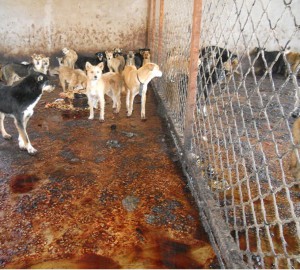 Yulin has become one of the most-discussed Chinese cities on the internet in recent years, only for a bad reason: the city was suddenly thrown under the spotlight in 2010 for its dog-eating event, known as the notorious Yulin Dog Meat Festival. Contrary to the pouring criticism from the international society, Yulin locals insist to see the Festival in a different light: Dog-eating is part of the custom so it’s nothing cruel or illegal; human eat other animals as well, then why not dogs? People in other parts of China eat dogs too, so why is Yulin alone taking all the blame?
Yulin has become one of the most-discussed Chinese cities on the internet in recent years, only for a bad reason: the city was suddenly thrown under the spotlight in 2010 for its dog-eating event, known as the notorious Yulin Dog Meat Festival. Contrary to the pouring criticism from the international society, Yulin locals insist to see the Festival in a different light: Dog-eating is part of the custom so it’s nothing cruel or illegal; human eat other animals as well, then why not dogs? People in other parts of China eat dogs too, so why is Yulin alone taking all the blame?
While the first two arguments have been discussed and refuted in IAR’s previous blog post Look at Dogs and See Friends? Well, Some See FOOD, the last question does bring up an interesting point. To international protesters and dog lovers, a small city like Yulin is already too much; unfortunately, the dog-eating phenomenon revealed there is just the tip of the iceberg. Yulin became a common target for public censure because it highlights dog meat as a festival specialty commercially. But in fact, dog-eating is not observed in Yulin only; nor is it limited to one specific day of the year. Instead, dog meat can be found in the everyday recipes of numerous different regions in China, including Jilin, Liaoning, Heilongjiang, Guangdong and Guangxi Province.
Another fact that adds to the brutality of dog-eating in China is where the dogs come from. Because of the absence of licensed dog farms, stray dogs and beloved pet dogs have become the main targets of dog meat dealers. One way to capture or steal those dogs is of course, by luring them with food, but a more “efficient” way is to dope the dogs with poisoned darts or blowpipe needles designed for capturing animals, both of which easily attainable on the largest Chinese e-commerce website Alibaba by anyone without a license.
Much to protesters and dog lovers’ disappointment, till today China does not have an animal welfare act to protect dogs from being killed for food. Nonetheless, most dog meat dealers are still illegal according to the country’s Food Safety Law, which explicitly prohibits the trading of meat products that have not been inspected or quarantined, or fail to pass inspection or quarantine performed by animal health inspection offices. Besides, an official notice published by the Ministry of Agriculture in 2013 also requires that every dog and cat to be transported must possess an individual certificate that proves its health condition. Under such laws and regulations, the majority of dog meat being sold in the market right now does not reach hygienic standards, and the costs of producing, trading and serving dog meat legally would make the business profitless. The only problem is that the provisions are not strictly enforced.
As a result, compared with focusing solely on a right-based approach to draft and enact a brand-new animal welfare act, which can take decades, or organizing violent protests at local restaurants and markets, which sometimes leads to blood and hatred, facilitating rigorous enforcement of the current laws and regulations seems to suggest a much more efficient means to reduce the amount of dog-eating. One critical thing for international protesters to remember is that the compassion for dogs is not rooted in all cultures and religions. Therefore, in a country where eating dogs is not always judged morally, it might take a different path to eradicate dog-eating than attempting to implant “dogs are friends” in everyone.
Photos: (left) piles of dog bodies to be made into dishes; (right) the typical horrible environment of “dog farms”

